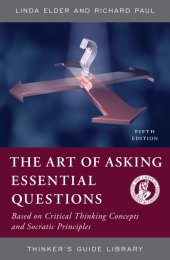The Art of Asking Essential Questions (Based on Critical Thinking Concepts and Socratic Principles)
Fifth Edition
Linda Elder and Richard Paul
Contact Info for Bloomsbury:
- For questions about orders you have already placed, email weborders@mpsvirginia.com or telephone 888-330-8477, ext. 7527.
- For questions about eBook purchases or pre-orders, email contact@bloomsbury.com.
- For general enquiries not related to online orders, call 1 212-419-5300 or email contact@bloomsbury.com.
The Art of Asking Essential Questions shines a light on an underappreciated but vital skill set that lies at the root of all learning and success. Not only do questions help us gain knowledge on a topic, but they also allow us to dispel erroneous or deceptive information, uncover assumptions and motivations, draw accurate conclusions, and make sustainable plans.
Linda Elder and Richard Paul illustrate the elements of an effective question and discuss the differences between analytic and evaluative questions. They also show how questions can uncover and help us avoid dangerous egocentric and sociocentric tendencies.
As part of the Thinker’s Guide Library, this book advances the mission of the Foundation for Critical Thinking to promote fairminded critical societies through cultivating essential intellectual abilities and virtues across every field of study across world.
Pages: 48 • Trim: 5 1/2 x 8
978-0-944583-16-6 • Paperback • January 2010
978-1-5381-3380-4 • eBook • June 2019
Series: Thinker's Guide Library
$28.00
Additional Information About:
The Art of Asking Essential Questions (Based on Critical Thinking Concepts and Socratic Principles)
The quality of our lives is determined by the quality of our thinking. The quality of our thinking, in turn, is determined by the quality of our questions, for questions are the engine, the driving force behind thinking. Without questions, we have nothing to think about. Without essential questions, we often fail to focus our thinking on the significant and substantive.
When we ask essential questions, we deal with what is necessary, relevant, and indispensable to a matter at hand. We recognize what is at the heart of the matter. Our thinking is grounded and disciplined. We are ready to learn. We are intellectually able to find our way about.
To be successful in life, one needs to ask essential questions: essential questions when reading, writing, and speaking; when shopping, working, and parenting; when forming friendships, choosing life-partners, and interacting with the mass media and the Internet.
Yet few people are masters of the art of asking essential questions. Most have never thought about why some questions are crucial and others peripheral. Essential questions are rarely studied in school. They are rarely modeled at home. Most people question according to their psychological associations. Their questions are haphazard and scattered.
The ideas we provide are useful only to the extent that they are employed daily to ask essential questions. Practice in asking essential questions eventually leads to the habit of asking essential questions. But we can never practice asking essential questions if we have no conception of them.
This mini-guide is a starting place for understanding concepts that, when applied, lead to essential questions. We introduce essential questions as indispensable intellectual tools. We focus on principles essential to formulating, analyzing, assessing, and settling primary questions. You will notice that our categories of question types are not exclusive. There is a great deal of overlap between them. Deciding what category of question to ask at any point in thinking is a matter of judgment. Having a range of powerful questions to choose from is a matter of knowledge.
Contents include:
- Questioning the Structure of Thinking
- Asking One System, No System, and Conflicting System Questions
- Questioning Dogmatic Absolutism and Subjective Relativism
- Questioning Concepts
- Questioning Data, Information, and Experience
- Questioning Questions: Identifying Prior Questions
- Asking Complex Interdisciplinary Questions
- Questioning in Decision-Making and Problem-Solving
- Evaluative Questions
- Determining Value, Merit, and Worth
- Evaluating Reasoning
- Questioning As We Read
- Questioning As We Write
- Questioning Within Academic Disciplines
- Essential Questions in Science
- Essential Questions in the Social Disciplines
- Essential Questions in the Arts
- Questioning for Self-Knowledge and Self-Development
